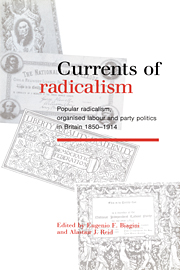 Currents of Radicalism
Currents of Radicalism Book contents
- Frontmatter
- Contents
- Notes on contributors
- Preface
- 1 Currents of radicalism, 1850–1914
- Part I Continuities in popular radicalism
- Part II The Liberal party and the people
- Part III Radicals, Liberals, and the Labour party
- 9 Labour and parliament: the Lib.-Labs. as the first working-class MPs, 1885–1906
- 10 Old Unionism reconsidered: the radicalism of Robert Knight, 1870–1900
- 11 Labour and local politics: radicalism, democracy and social reform, 1880–1914
- 12 Ideological debate in Edwardian Labour politics: radicalism, Revisionism and socialism
- Index
9 - Labour and parliament: the Lib.-Labs. as the first working-class MPs, 1885–1906
from Part III - Radicals, Liberals, and the Labour party
Published online by Cambridge University Press: 07 September 2010
- Frontmatter
- Contents
- Notes on contributors
- Preface
- 1 Currents of radicalism, 1850–1914
- Part I Continuities in popular radicalism
- Part II The Liberal party and the people
- Part III Radicals, Liberals, and the Labour party
- 9 Labour and parliament: the Lib.-Labs. as the first working-class MPs, 1885–1906
- 10 Old Unionism reconsidered: the radicalism of Robert Knight, 1870–1900
- 11 Labour and local politics: radicalism, democracy and social reform, 1880–1914
- 12 Ideological debate in Edwardian Labour politics: radicalism, Revisionism and socialism
- Index
Summary
In 1898 Henry Broadhurst, MP, the first workman to be appointed a government minister, was present at the state funeral of William Gladstone. On leaving Westminster Hall, the former stonemason remembered with pride an earlier time he had laboured at the Houses of Parliament:
my eye involuntarily sought the clock tower, on whose tall flanks I had worked, chilled to the bone, nearly thirty years before; and my memory recalled one bitter cold, wet day in the winter of 1858–59 when, almost barefoot, I had crossed the Palace Yard … The contrast was almost overwhelming: then unknown and penniless; today in a place of honour, the sorrowing colleague of the greatest Englishman of the century.
In the late nineteenth century Broadhurst held the distinction of being one of the first of a small group of working-class MPs, known as Lib.–Labs., who sat in the House of Commons as labour members but were ardent Gladstonian Liberals in politics. For after Chartism, the dominant feature of English working-class politics was not the emergence of an independent working-class movement, but the rise of an influential group of Victorian trade union and labour leaders who broadly accepted the tenets of liberal capitalism. For this new elite of working-class politicians, parliament was often the culmination of a professional career as a trade union leader and labour organiser.
In 1897, Herbert Samuel, of the National Liberal Federation, urged Gladstone to support Sam Woods, the miners' leader and Lib.–Lab.
- Type
- Chapter
- Information
- Currents of RadicalismPopular Radicalism, Organised Labour and Party Politics in Britain, 1850–1914, pp. 187 - 213Publisher: Cambridge University PressPrint publication year: 1991
- 3
- Cited by


